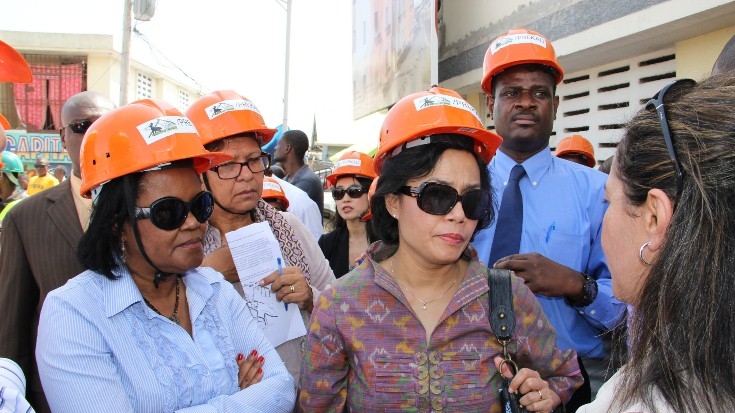For two hours both women crisscrossed of Delmas 32, a neighborhood of Port-au-Prince on this hot day by foot. Streets and alleys are buzzing with life and traffic. There are freshly painted homes, streetlights and a new canal system where not long ago rubble from collapsed homes had buried whole families.
For Marie Carmelle Jean-Marie, Haiti’s economy and finance minister, and Sri Mulyani Indrawati, the World Bank’s Managing Director and COO, this place symbolizes recovery and hope. It shows what a country can do with the right support and international aid.
“I came here only a few months after the earthquake and I am so impressed with the progress Haiti has made in rebuilding. Then, when I stood on the remains of what was a house, a home, it was tough to imagine that life could return to this place,” says Indrawati.
Born on almost opposite sides of the globe, in countries that share little but a warm climate and a very high likelihood of being hit by a natural disaster, the minister and the World Bank official discover quickly that they have a lot in common. To start with, their parents instilled in them a deep love for their country. Secondly, the former finance minister of Indonesia and the current finance minister of Haiti have succeeded in roles usually dominated by men.
“I never give up something I undertake. It is my upbringing. I grew up in the countryside and we were raised to serve,” says Marie Carmelle Jean-Marie. “I used to climb behind my father on his horse and would help him at work. Together, we used to teach farmers how to read and write using charcoal on a whitewashed wall. I was raised to be determined.”
“My parents taught me to think beyond the task at hand and to think of your country before you think of yourself,” says Sri Mulyani. “I am the seventh child out of ten. My mother always worked and she had a PhD. There was never a question that she expected me to give my best.”
Talking through an interpreter, they exchange experiences from the world of policy making and the weight of high expectations, limited resources, and tough choices.
One had to deal with the aftermath of the devastating earthquake, the other with responding to the tsunami in Aceh. Whether faced with a looming economic collapse following the financial crisis in Indonesia or dealing with high poverty and low revenue in Haiti, both are driven by a deep-rooted commitment to their country. The lesson they learned: With limited space, you do the best possible because perfect may be out of reach.
Recent data shows that fewer Haitians are poor compared to ten years ago, but most of the progress is found in cities where people are also almost six times more likely to have access to energy. Meanwhile, the need for more and better services – whether in education, sanitation, clean water or roads - outstrips the country’s ability to deliver.
“Sri Mulyani and I discussed this a bit. And I would like to talk to her further. She may have some ‘recipes’ for me,” says Jean-Marie. “Her country is more advanced than Haiti. But I am sure she too had to manage difficult tradeoffs and make choices that had an impact on the real economy while reducing poverty at the same time. The fact that she was also a minister of finance means she knows these kinds of problems. It helps our conversation. She is a good listener.”
The reconstruction following the earthquake is almost complete. 1.3 million people have moved from camps to neighborhoods, living in safer homes. As the recovery phase is coming to an end, Haiti is looking at declining aid from the international community. The need to turn development projects into projects fully owned by Haiti is more pressing than ever.
A good example is the water treatment and distribution initiative both women visited in Les Cayes, a community in southern Haiti. The project is supported by the World Bank. For a fee, about 60,000 inhabitants get a tap providing clean water. This can be a truly life-saving improvement as Haiti still combats cholera and a high prevalence of diarrhea. The finance minister would like to continue delivering these services, but worries that Haiti cannot afford it.
“Not to honor a commitment, to me that is the worst shame. I have to keep going. I believe the most difficult post is the one of minister of finance. You have everyone against you because there is no way of satisfying everyone,” says Jean-Marie.
“I know this feeling well,” says Sri Mulyani. “You almost cannot win. But I hope we will be able to work with Haiti on addressing some of these dilemmas. There are many opportunities here, but tapping into them won’t be straight forward. It is not an easy journey but I hope we’ll do it together.”
Asked about her vision for Haiti in five years, Jean-Marie says: “Haiti will hopefully be different. Maybe not richer, but we may be able to make better choices and finally tap into our enormous human and economic potential.”

